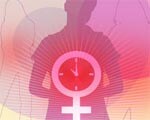Women who had their first menstrual period at a relatively later age have an easier time giving birth to their first child.

It's known that older women have a higher rate of intervention during delivery - either by caesarean section (c-section) or with the help of forceps or a vacuum device. It has been hypothesised that this is because of a harmful effect of a prolonged interval between menarche (first menstrual cycle) and first birth on uterine function.
The uterine muscles are profoundly controlled by oestrogens and progoesterone and it's possible that prolonged hormonal stimulation causes some amount of dysfunction in those muscles - leading to more difficult labour and a higher rate of unplanned c-sections and instrument-assisted delivery.
Researchers studied 3,739 women, who gave birth to their first child, aimed to test the hypothesis that the risk of c-section at first delivery would decline with later age at menarche. The data regarding height, body mass index (BMI), marital status, smoking status, induction of labour, week of gestation of delivery and birth weight percentile were collected from the study participants.
It was found that the older a woman was when she had her first period, the less likely she was to need a c-section or a vaginal delivery using forceps or a vacuum pump. Among women who had started their periods at age 12 or younger, 32 percent required a c-section or instrument-assisted delivery. Those women who'd begun menstruating at the ages of 13, 14 or 15 or older, 30 percent, 29 percent and 27 percent respectively women required operative delivery.
The researchers concluded that the longer a woman is exposed to the hormonal fluctuations of menstruation, the greater the likelihood of impaired uterine function leading to interventions during delivery.
DoctorNDTV is the one stop site for all your health needs providing the most credible health information, health news and tips with expert advice on healthy living, diet plans, informative videos etc. You can get the most relevant and accurate info you need about health problems like diabetes, cancer, pregnancy, HIV and AIDS, weight loss and many other lifestyle diseases. We have a panel of over 350 experts who help us develop content by giving their valuable inputs and bringing to us the latest in the world of healthcare.












